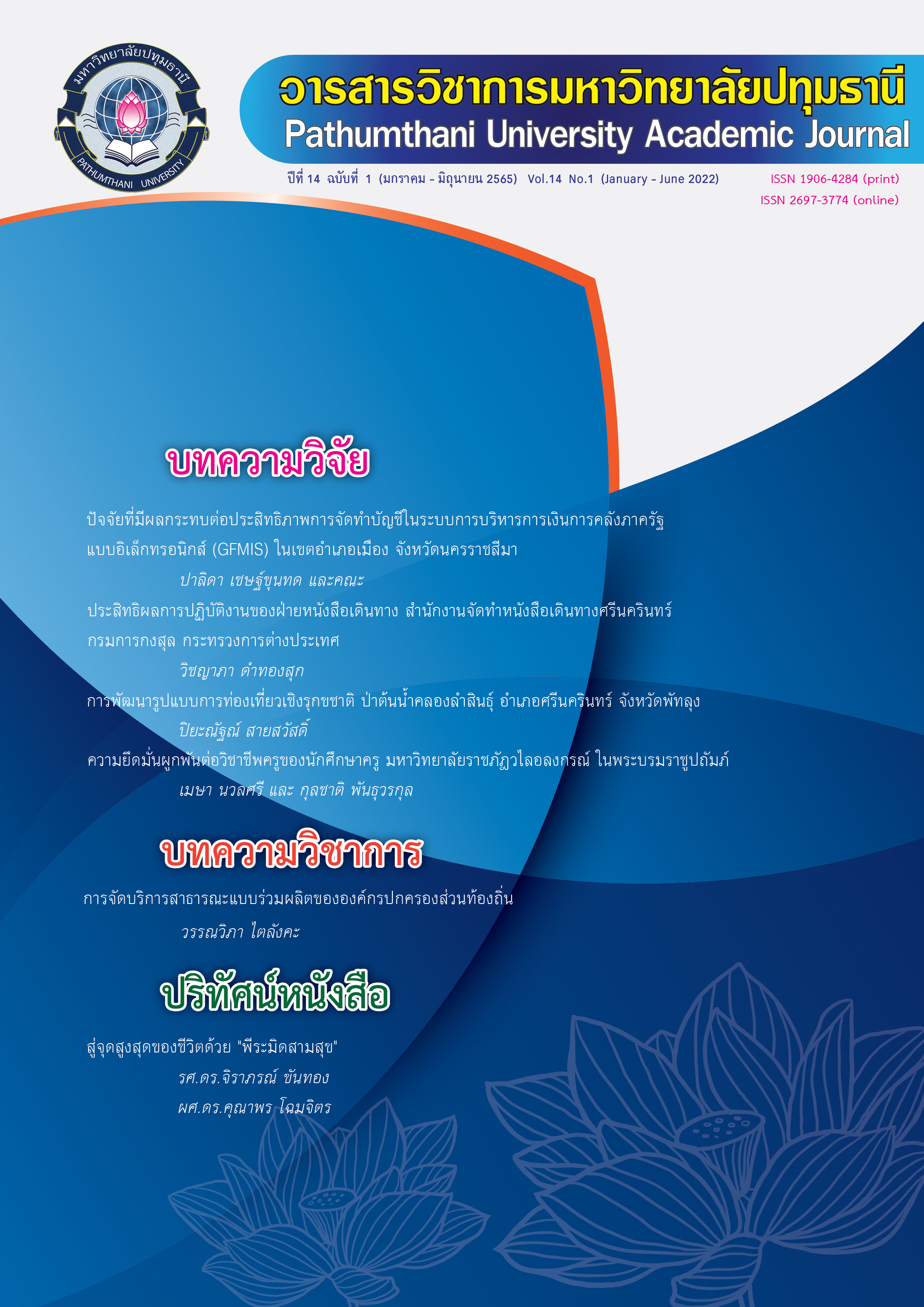FOLK MUSICAL DRAMA: DEVELOPMENTAL PROCESS OF IMPROVISATIONAL ACTING SKILLS
Keywords:
Improvisation, Skill Development , Folk DramaAbstract
The research article was part of the Doctor of Arts program thesis in Department of Thai Dramatic Arts on "Innovation in Folk Musical Drama" The objective of this research was to study the process of drama for the development of “folk musical theater” performances using the improvisation concept of “Viola Spolin” who used the practice of acting skills through games and improvisation in hypothetical situations to develop learners. There were 20 students in the performing arts major at the University of the Thai Chamber of Commerce for a period of 8 weeks. The research aimed to develop skills in folk song improvisation for participants, including the adoption of the 4 forms of folk song improvisational approaches: 1) improvisation 2) continue improvisation 3) interactive improvisation and 4) improvisation as a story. The researcher therefore designed the aforementioned process to develop the skills of drama and folk song improvisation into 3 steps as follows: 1) principles and concepts 2) skill development and tool experimentation and 3) experience exchange. The data were then collected and analyzed using summaries based on note-taking, participant observations, and interviews with participants.
The study found that students were able to learn and develop their skills by participating in activities. The researcher discovered two interesting problems affecting the students' acting skills development: 1) Theatrical arts skills included character needs and character accessibility. 2) The skills of improvisation consisted of rhyme accuracy, lexical knowledge, and listening process. These were considered useful for the development of the actor's skill exercises and the creative process of performing folk songs.
References
กมลเนตร สุวรรณาพิสิทธิ์ และ เมตตา วิวัฒนานุกูล. (2553). “นักร้องเกาหลีและกระแสนิยมเกาหลีของกลุ่มแฟนคลับเมืองไทย”. วารสารนิเทศศาสตร์. ปีที่ 28 ฉบับที่ 2. หน้า 108-122.
กาญจนา แก้วเทพ. (2552). สื่อเล็ก ๆ ที่ใช้ในการพัฒนา. กรุงเทพมหานคร : จุฬาลงกรณ์มหาวิทยาลัย.
เจตนา นาควัชระ. (2546). ศิลป์ส่องทาง: รวมบทความวิชาการ. สุวรรณา เกรียงไกรเพ็ชร์ (บรรณาธิการ). กรุงเทพมหานคร : คมบาง.
บัวผัน สุพรรณยศ. (2561). กลอนเพลงพื้นบ้านภาคกลาง: ปฏิพากย์ ปฏิภาณ การสร้างสรรค์. กรุงเทพมหานคร : ห้างหุ้นส่วนจำกัดสามลดา.
ฝ่ายกิจการนักศึกษา. (2562). เอกสารการประชุมที่ปรึกษาชมรมกิจกรรมนักศึกษาประจำปีการศึกษา 2563. มหาวิทยาลัยหอการค้าไทย. เอกสารอัดสำเนา.
พรชนก สุทาตัน และ รุจี ศรีสมบัติ. (2560). “การขับซอพื้นบ้านล้านนา: กรณีศึกษาแม่บัวชุม จันทร์ทิพย์”. ใน โครงการประชุมวิชาการระดับชาติ: ศิลปกรรมวิชาการ ครั้งที่ 2: ศิลปะ 4.0: ศิลปะเพื่อการสร้างสรรค์และศิลปะเพื่อการศึกษา. กรุงเทพมหานคร : มหาวิทยาลัยศรีนครินทรวิโรฒ.
พรรัตน์ ดำรุง. (2557). ละครประยุกต์ การใช้ละครเพื่อการพัฒนา. กรุงเทพมหานคร : จุฬาลงกรณ์มหาวิทยาลัย.
สดใส พันธุมโกมล. (2538). ศิลปะของการแสดง ละครสมัยใหม่. กรุงเทพมหานคร : จุฬาลงกรณ์มหาวิทยาลัย.
สุรพล วิรุฬห์รักษ์. (2547). หลักการแสดงนาฏยศิลป์ปริทรรศน์. กรุงเทพมหานคร : จุฬาลงกรณ์มหาวิทยาลัย.
เอนก นาวิกมูล. (2550). เพลงนอกศตวรรษ. (พิมพ์ครั้งที่ 5). กรุงเทพมหานคร : เมืองโบราณ.
Bolton, G. (1993). Drama in Education and TIE: A Comparison. In T. Jackson (ed.), Learning Trough Theatre. London: Routledge.
Johnstone, K. (1979). Improvise: Improvisation and the Theatre. NY: Routledge.
Levy, G. (2005). 112 acting games: a comprehensive workbook of theatre
games for developing acting skills. (ed.), Colorado Springs, CO: Meriwether.Spolin, V. (1986). Theater games for the classroom. A teacher handbook. Evanston Illinois. Northwestern University Press.
Downloads
Published
How to Cite
Issue
Section
License
Copyright (c) 2022 กิตติพงษ์ อินทรัศมี

This work is licensed under a Creative Commons Attribution-NonCommercial-NoDerivatives 4.0 International License.
บทความที่ได้รับการตีพิมพ์เป็นลิขสิทธิ์ของวารสารมหาวิทยาลัยปทุมธานี
ข้อความที่ปรากฎในบทความแต่ละเรื่อง เป็นความคิดเห็นส่วนตัวของผู้เขียน กองบรรณาธิการไม่จำเป็นต้องเห็นด้วยเสมอไป และไม่มีส่วนรับผิดชอบใด ๆ ถือเป็นความรับผิดชอบของผู้เขียนแต่เพียงผู้เดียว



